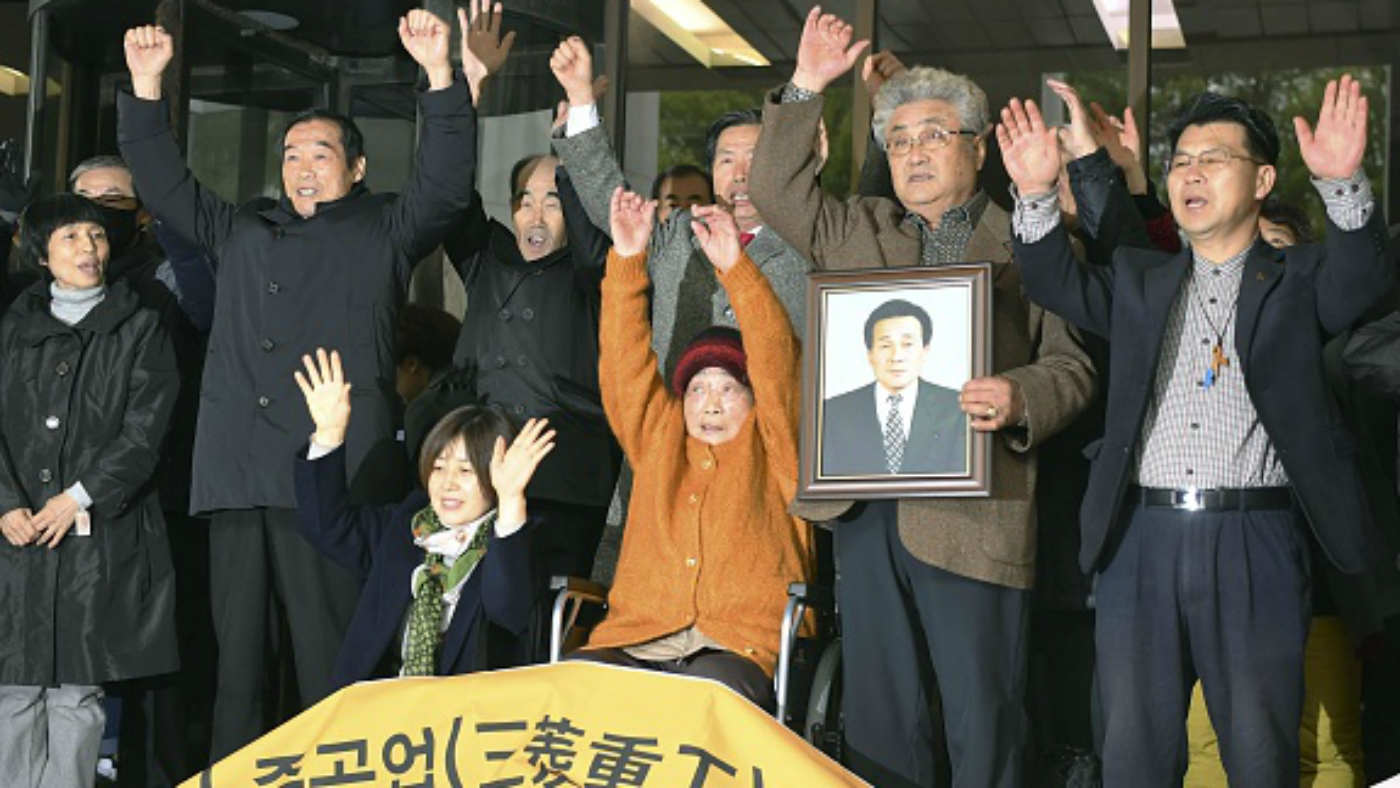Mitsubishi ordered to pay compensation for WWII slave labour
Eleven victims win court ruling as tensions rise between Japan and South Korea

A free daily email with the biggest news stories of the day – and the best features from TheWeek.com
You are now subscribed
Your newsletter sign-up was successful
South Korea’s Supreme Court has ordered a Japanese company to compensate 11 South Koreans who were subject to forced labour during the Second World War. Mitsubishi Heavy Industries Ltd must pay up to 150m won (£104,000) to the victims or their relatives.
The court’s decision upholds two lower court rulings, one of which ordered Mitsubishi Heavy Industries to pay five women between 100m and 150m won, and in a separate ruling an additional 80m won to six men who were forced to work in a Mitsubishi shipyard and machine tool factory during the war.
One of the plaintiffs, 90-year-old Kim Seong-ju, cried as she spoke to the press. “I have harboured this grudge all my life, and I’m still living as if all of my bones protrude. That’s the weight of my grudges,” she said.
The Week
Escape your echo chamber. Get the facts behind the news, plus analysis from multiple perspectives.

Sign up for The Week's Free Newsletters
From our morning news briefing to a weekly Good News Newsletter, get the best of The Week delivered directly to your inbox.
From our morning news briefing to a weekly Good News Newsletter, get the best of The Week delivered directly to your inbox.
This is the court’s second blow to Japan, following the landmark verdict in October in favour of a group of South Koreans forced to work for Japan’s Nippon Steel & Sumitomo Metal Corp during the war.
Despite Japan’s insistence that reparations for forced labour were settled in a peace treaty at the end of the war, the court rulings uphold the right of individual victims to seek compensation.
In a statement issued after the Mitsubishi ruling, Japan’s foreign minister, Taro Kono, warned that the verdict “fundamentally overturns the legal basis for friendly ties between Japan and South Korea”.
The Daily Telegraph reports that political analysts fear the court’s decision will intensify an already strained relationship between the two countries.
A free daily email with the biggest news stories of the day – and the best features from TheWeek.com
“There is a deep frustration in Tokyo that these sorts of rulings make it difficult to move forward on issues such as economic cooperation, security in north-east Asia and any number of other pressing matters right now,” Jun Okumura, a political analyst at the Meiji Institute for Global Affairs, told the Telegraph.
During the war, thousands of Koreans were forced to work in factories and mines in Japan. Korean women were among the thousands coerced into working as “comfort women”, or sex slaves, for Japanese troops across Asia.
-
 The ‘ravenous’ demand for Cornish minerals
The ‘ravenous’ demand for Cornish mineralsUnder the Radar Growing need for critical minerals to power tech has intensified ‘appetite’ for lithium, which could be a ‘huge boon’ for local economy
-
 Why are election experts taking Trump’s midterm threats seriously?
Why are election experts taking Trump’s midterm threats seriously?IN THE SPOTLIGHT As the president muses about polling place deployments and a centralized electoral system aimed at one-party control, lawmakers are taking this administration at its word
-
 ‘Restaurateurs have become millionaires’
‘Restaurateurs have become millionaires’Instant Opinion Opinion, comment and editorials of the day
-
 Ex-South Korean leader gets life sentence for insurrection
Ex-South Korean leader gets life sentence for insurrectionSpeed Read South Korean President Yoon Suk Yeol was sentenced to life in prison over his declaration of martial law in 2024
-
 Epstein files topple law CEO, roil UK government
Epstein files topple law CEO, roil UK governmentSpeed Read Peter Mandelson, Britain’s former ambassador to the US, is caught up in the scandal
-
 Iran and US prepare to meet after skirmishes
Iran and US prepare to meet after skirmishesSpeed Read The incident comes amid heightened tensions in the Middle East
-
 Israel retrieves final hostage’s body from Gaza
Israel retrieves final hostage’s body from GazaSpeed Read The 24-year-old police officer was killed during the initial Hamas attack
-
 China’s Xi targets top general in growing purge
China’s Xi targets top general in growing purgeSpeed Read Zhang Youxia is being investigated over ‘grave violations’ of the law
-
 Panama and Canada are negotiating over a crucial copper mine
Panama and Canada are negotiating over a crucial copper mineIn the Spotlight Panama is set to make a final decision on the mine this summer
-
 Why Greenland’s natural resources are nearly impossible to mine
Why Greenland’s natural resources are nearly impossible to mineThe Explainer The country’s natural landscape makes the task extremely difficult
-
 Iran cuts internet as protests escalate
Iran cuts internet as protests escalateSpeed Reada Government buildings across the country have been set on fire